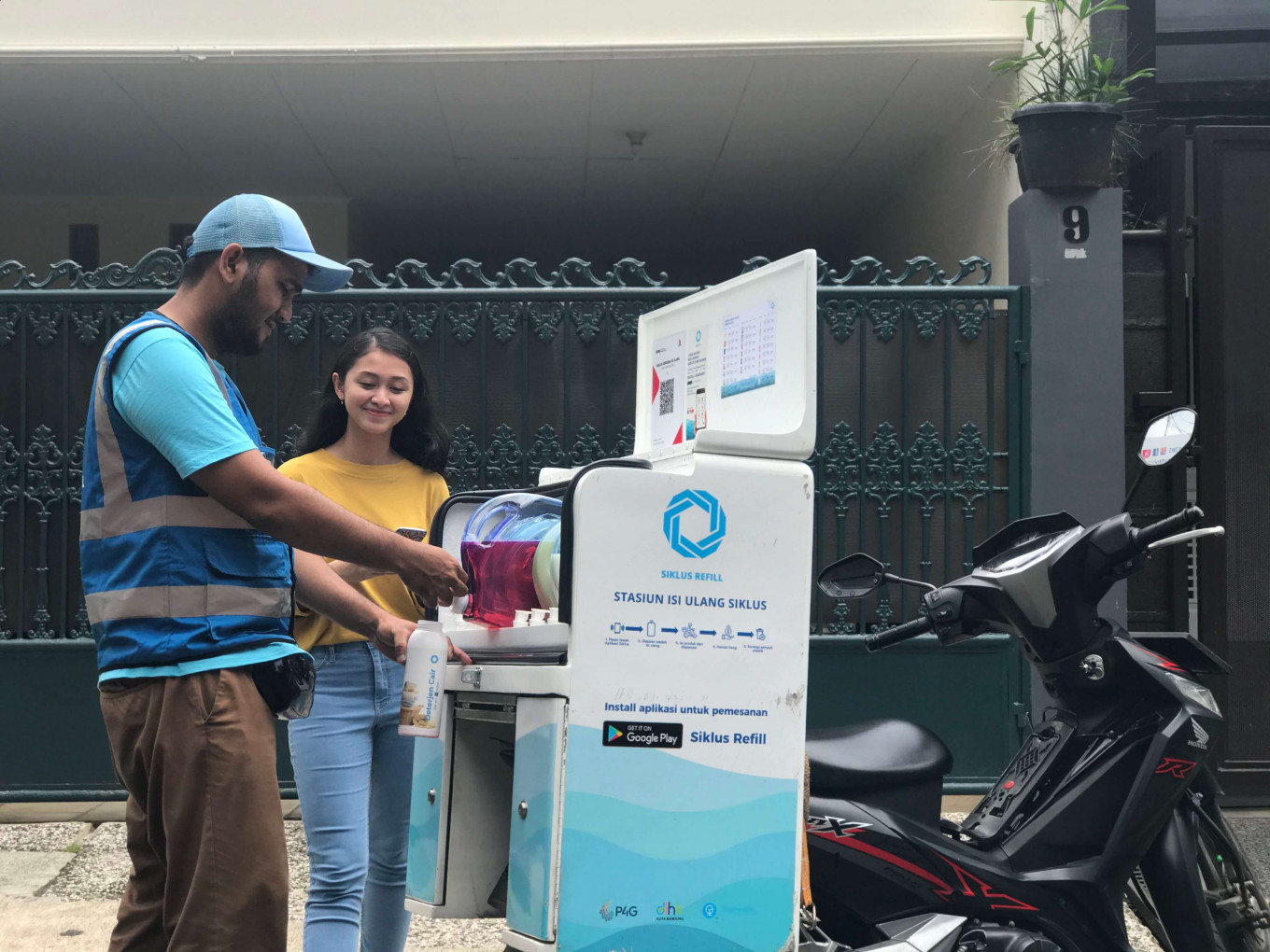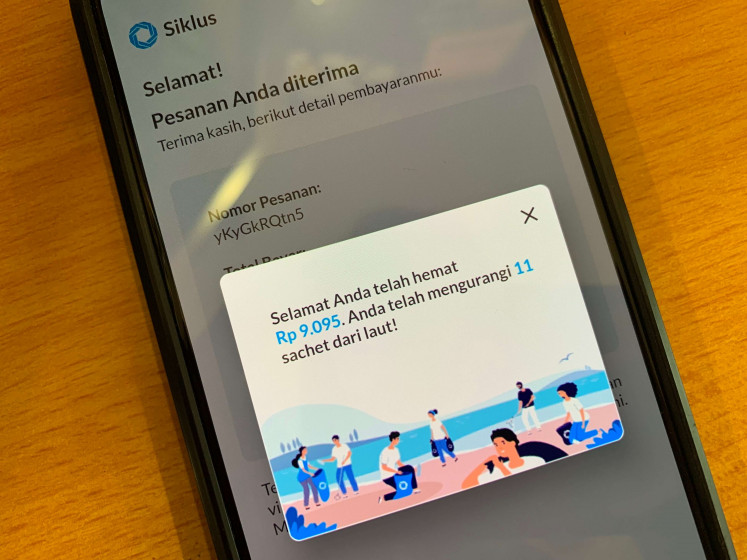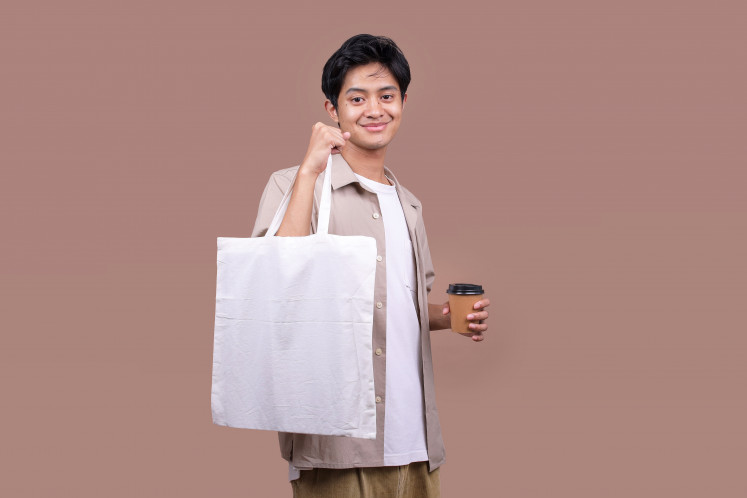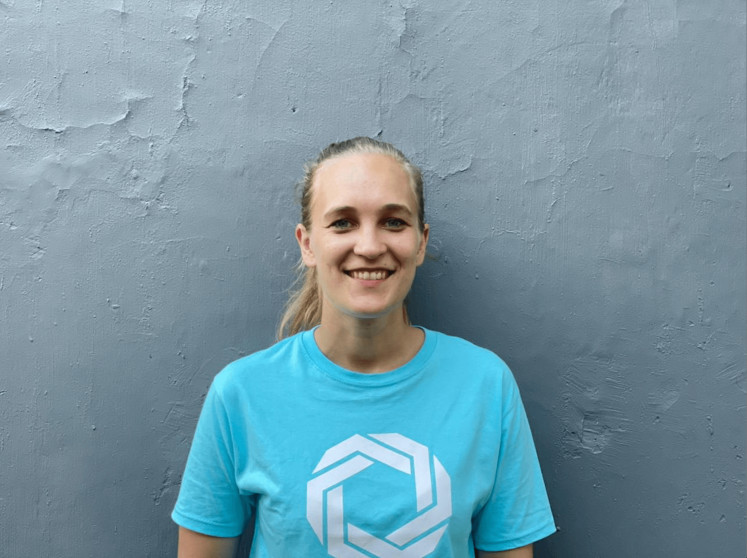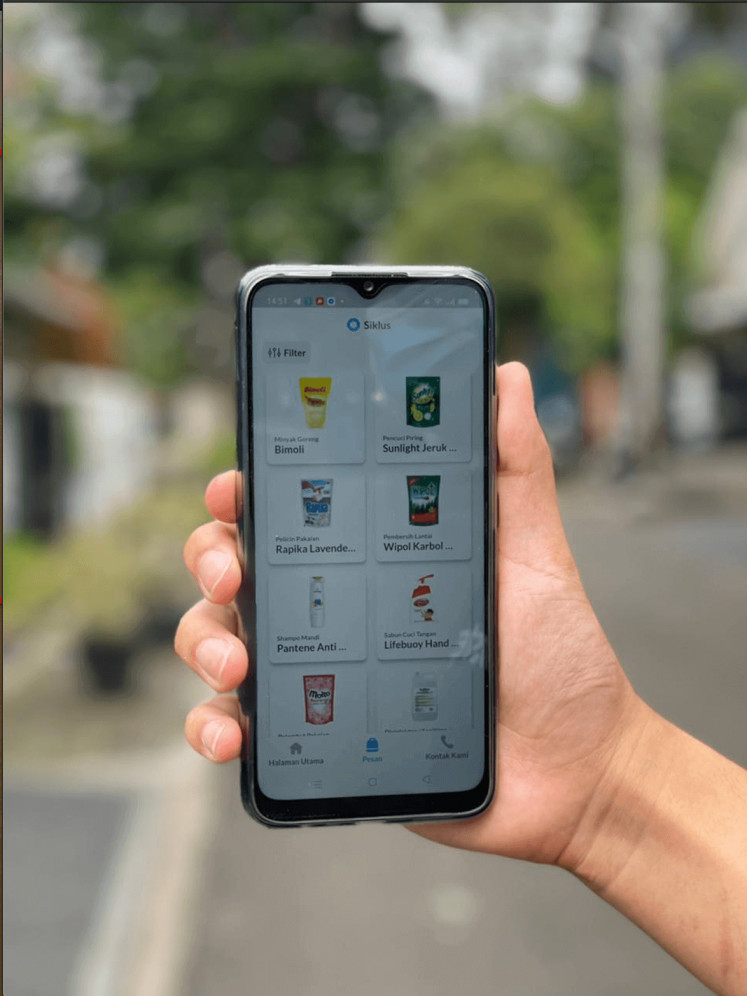Popular Reads
Top Results
Can't find what you're looking for?
View all search resultsPopular Reads
Top Results
Can't find what you're looking for?
View all search resultsSachet-free shopping: Start-up introduces new environmentally friendly way to refill products
Siklus introduces sachet-free shopping to tackle waste problems, one refill at a time.
Change text size
Gift Premium Articles
to Anyone
R
etailers are facing the tough challenge of balancing the health of their business with the rise of environmental sentiment and sustainability scrutiny. In the end, they create and sell products that still generate waste, despite their shift to recyclable packaging in addressing the issue. But whether their packaging – often promoted as being recyclable and biodegradable – can be a solution remains a question. An early-stage start-up called Siklus (Cycle) challenges retail's longstanding formula of eye-catching packaging and throwaway sachets with their on-demand refillable model.
Siklus works by delivering sachet-free personal care and home cleaning products to the customers' doorstep, where they can use their own containers to refill the products as much as they want. Since Siklus' launch in 2019, its business model has changed a few times, from providing refill stations in tricycles to supplying roadside stalls with jerry cans filled with shampoo, liquid soap, cooking oil, detergent, dishwashing soap and a few others.
Ocean-friendly: An in-app Siklus feature calculates the amount of sachets and money saved from a purchase. (Siklus/Courtesy of Siklus Refill)Today, Siklus utilizes a mobile app, Instagram's direct messaging feature and WhatsApp for customers to place their orders, covering neighborhoods in Greater Jakarta with motorbikes. Like any other on-demand delivery service witnessing a surge in the tough times of the pandemic, Siklus offers practicality, convenience and competitive prices thanks to its packaging-free concept.
The cost of sachets
Siklus' founder Jane von Rabenau started to see sachets as problematic during her time working in Chennai, South India. She witnessed the horrific floods in 2015 hitting the city, made worse by plastic waste blocking the drainage systems.
Read also: Solar start-up Xurya becomes first recipient of Southeast Asian green fund
Von Rabenau told The Jakarta Post: "Most of my friends [in Chennai], they came from very humble backgrounds, and they [use] sachets to purchase all of their everyday needs. To me, it seems like just a broken system of retail where you're paying more for the packaging than the product. Often, the poorest people end up paying the most, and to me, it just feels like a very inefficient system; it doesn't really make sense, and it's causing a lot of problems."
Reinventing retail: Siklus founder Jane Von Rabenau witnessed the mounting environmental problem of sachets during her time working in Chennai, South India, where sachets are ubiquitous. (Siklus/Courtesy of Siklus Refill)According to consumer trend firm Trendwatching, using sachets as a microselling method expands the businesses' reach to broader demographics, getting low-income customers to know and experience their products. But considering the detrimental environmental costs and the poverty tax imposed on the customers, it goes without saying that the microselling method is beneficial for the business giants only.
Data has shown that sachets have been a waste nightmare in Southeast Asia, especially Indonesia. Southeast Asia accounts for almost 50 percent of the global sachet market, according to a Greenpeace report titled "Throwing Away the Future: How Companies Still Have it Wrong on Plastic Pollution "Solutions".
As stated on Harvard Kennedy School's website, in Indonesia, sachets and wrappers account for almost 20 percent of the plastic items found on Indonesian beaches, not to mention Indonesia's "achievement" as the second-biggest marine pollutant.
With this alarming concern in mind, Von Rabenau, supported by mounting information stating the urgency of being mindful of the waste we generate, decided to launch Siklus in Indonesia where she knew no one, changing the way people shop one refill at a time.
Welcoming response
Siklus was originally created to cater to low-income communities, but it has been getting a tremendous response from middle-income communities as well.
"In general, the response is overwhelmingly good, and people are really excited about this new model," said Von Rabenau.
She explained that some turn to Siklus to spend less, but some are on board for practicality and environmentally friendly reasons.
Sharadeba, 39, a dentist in South Tangerang, Banten, benefits from the convenience of Siklus.
On-demand: Siklus utilizes a mobile app, Instagram messaging and WhatsApp for customers to place their orders. (Siklus/Courtesy of Siklus Refill)She said, "I saw the digital ads and I think it's good that I don't need to carry these homecare products all the way from the supermarket."
Sharadeba added that she had bought from Siklus once, but it was likely that she would be making a repurchase.
The same goes for Arum Satyasari, 45, a climate change specialist in a consulting company.
Read also: The color of money: Indonesia’s green organizations fight corporate ‘greenwashing’
"I like that using Siklus is very practical, affordable and generates less waste," said Arum, who has been starting to reduce household waste by composting and creating eco-enzyme.
Siklus landed on her radar through her community unit's WhatsApp group.
The idea of refilling is closely associated with purchasing sachets and pouches available in the supermarket, only to go home and squeeze them in pre-owned containers. In that sense, Von Rabenau thinks that the concept of refilling is not entirely new. She is also optimistic about Siklus' potential to reach the masses.
"I think that the vast majority of Indonesians are aware of plastic waste. They may not be [total] eco-warriors, but they are aware of it, are sick of it and want to do something about it — but it's just a really overwhelming problem for them. Through Siklus, it's like giving people a chance to do something about this while saving money, and I think it is something that people would really appreciate."

